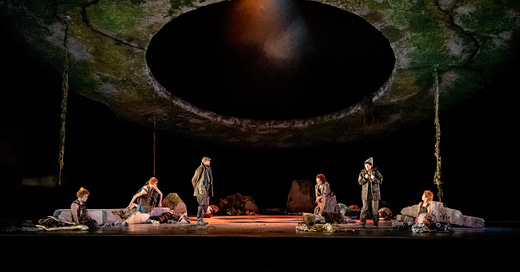A woodland clearing in Act III: Ross Ramgobin (Forester) and Hongni Wu (Servant) standing, Sarah Connolly (Ježibaba) seated between them. Picture Camilla Greenwell
Forty years have passed since Dvorak’s Rusalka found a secure place in the international repertoire thanks to David Pountney’s mould-breaking English National Opera staging, my first of this opera in the theatre. Back in 1983, when Stefanos Lazaridis’s Freudian dreamworld sets and turn of the 20th century costumes were unveiled - the opera premiered in Prague in 1901 - Rusalka still counted as a rarity outside the Czech-speaking world. Even ten years later, if it was seen at all, it was staged as picturesque replica of the natural world of Dvorak’s native Bohemia: a 1993 production at the Met by Otto Schenk - director of the same company’s “rocks and trees” Ring cycle - evoked an aqueous wonderworld of moonlit forest glades and rocky pools, inhabited by water-nymphs and goblins (the opera’s title is not a proper name but the generic Czech word for a freshwater mermaid).
Pountney’s Freudian analysis of Jaroslav Kvapil’s popular mythology, told Rusalka’s story in terms of an adolescent fantasy of blossoming womanhood, a romantic “Spring’s Awakening” rêverie with a dark twist: the mermaid’s longing for the love of an emotionally uncomprehending human transforms her into the agent of his death, as he eventually dies from her poisoned embrace. This staging uncovered psychological depths and dark pathologies in Dvorak’s opera, previously considered a naive, and picturesque folk tale, rather than a serious example of conceptual music-theatre, and saw six series of performances over a period of 15 years.
The Royal Opera came late to the party in 2003 - its first Rusalka was given in concert, conducted by Czech specialist, Charles Mackerras, as a vehicle for Renée Fleming, heading a top-flight international cast - but Dvorak’s masterpiece finally achieved a full staging in 2012 when Covent Garden presented a 2008 Salzburg production whose quotidian, kitchen-sink, present-day reimagining of the opera’s woodland world in an urban whorehouse was probably an updating too far for London audiences at the time. The production was never revived.
So, 11 years on, it was certainly time for another attempt, even if the current Rusalka - “created” and directed by Nathalie Abrahami and Ann Yee, heading all-female production team - can hardly be called a “new look”. The Royal Opera’s website blurb promises a “poetic, contemporary staging” but the setting and style of the staging, would have looked old-fashioned forty years ago, let alone today.
Keep reading with a 7-day free trial
Subscribe to Operalogue to keep reading this post and get 7 days of free access to the full post archives.




